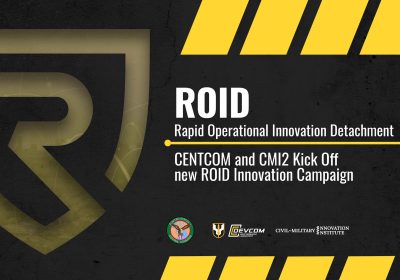CMI2 Awarded Contract to Help ‘Solve Valley of Death’
MORGANTOWN, WV — (June 2, 2022) — The U.S. Army Combat Capabilities and Development Command’s Army Research Laboratory awarded West Virginia-based Civil-Military Innovation Institute Inc. (CMI2) a three-year contract to develop a platform and methodology for Future Force Requirements and Experimentation (FFRE). The project focuses on broadening improved requirements, development, and execution of early-stage technologies (to include but not limited to advanced communications, smart sensors, cyber, and 5G) to formal military capabilities, using existing use cases as data. FFRE will identify needed requirements to advance the Army Modernization Strategy to ensure technology fielded can make an easy transition to enhance combat readiness for Soldiers.
The timing of the project coincides with the renewed emphasis from the Office of the Secretary of Defense (OSD) on the development of solutions to the “valley of death” issue, which refers to the transition of early-stage technologies to formal military capabilities for small businesses working with the Department of Defense (DoD).
“With the threats that the nation currently faces around the world, it is more important than ever that our Army forces can capitalize on the best innovations that American industry has to offer. The Future Force Requirements Experimentation program is a critical effort to help solve the ‘valley of death’ problem that impedes the Army’s ability to rapidly benefit from new technologies, and I was proud to authorize and fund this kind of work. Through this effort, West Virginia will become a national center of excellence for high-tech, military experimentation,” said U.S. Senator Shelley Moore Capito (R-W.Va.).
The program will have a heavy focus on technology experimentation and provide facilities and infrastructure for small technology providers to tune their solutions against current and future Army tactics, techniques, and processes (TTPs). CMI2 will provide red-teaming and an Adaptive Experimentation Force (AEF) as a “sparring partner” to test the limits of the technology solutions.
“This program is attacking an Army problem that does not have a silver bullet solution, but needs several methods/options to resolve,” said Dr. Arwen DeCostanza, FFRE program manager, DEVCOM Army Research Laboratory. “The FFRE model targets options for inserting emerging technology into the acquisition cycle and more rapidly into the Warfighters’ hands.”
Technology experimentation associated with FFRE will take place at a novel, multi-domain training and test range at Fola, West Virginia, on a former coal mine site. The Fola experimentation range provides a unique environment for the evaluation of emerging technologies and associated operational concepts in conjunction with military training activities.
Formal experimentation activities begin in August 2022 and will involve elements of the Army, West Virginia National Guard, and AEF. Initial experiments will focus on electromagnetic spectrum operations, an area of critical importance in future military conflicts.
“CMI2 has been evaluating this problem for years and developed the FFRE concept from extensive outreach and discussions with technology providers and DoD acquisition executives,” said Aly Goodwin Gregg, vice president, CMI2. “Ultimately, this methodology will become a blueprint for a more efficient way of getting technology into the warfighter’s hands at scale.”




